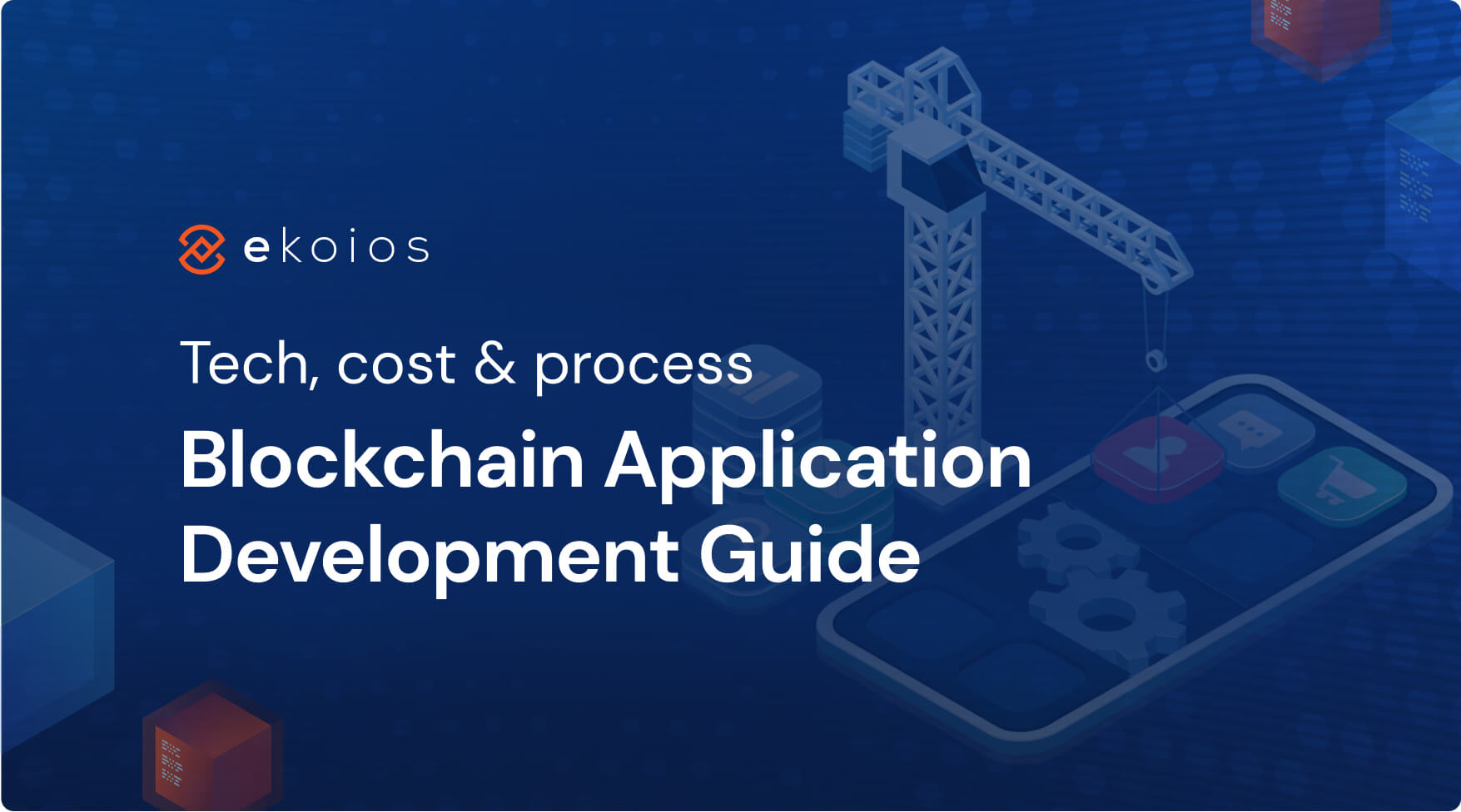
- 1
- 2
- 3
- 4
- 5
- 6
- 7
- 8
Blockchain is commonly known for crypto trading, but its potential extends far beyond that. Virtually all industries, from manufacturing to media, finance, healthcare, energy, real estate, and even the government are seeing increased usage of blockchain applications as an effort toward data transparency, security, and efficiency.
However, a business shouldn’t invest with the fear of missing out and without a clear understanding of blockchain application development – something that we can definitely help with! So, journey with us through this article about the technology, top applications, and the how-tos of developing a blockchain application to success.
Defining Blockchain and Its Applications
What is blockchain application development?
The primary distinction between blockchain and traditional applications is that traditional apps are owned and managed by a centralized authority. Traditional databases keep all data on a single server, and the central authority must validate a user’s credentials before granting access to the data. Blockchain applications development, also called dApp blockchain application development, are decentralized, shared databases, which means that all users have access to and can exchange messages and data without the use of a server.
How does blockchain technology work?
A blockchain is a network that shares all data among its peers, storing it chronologically in chain blocks. This means that when something happens in a blockchain network (for example, a transaction or data exchange), it is shared with all network members for verification and approval. Data cannot be changed after it has been added to the chain, making it extremely difficult to violate and steal data from.
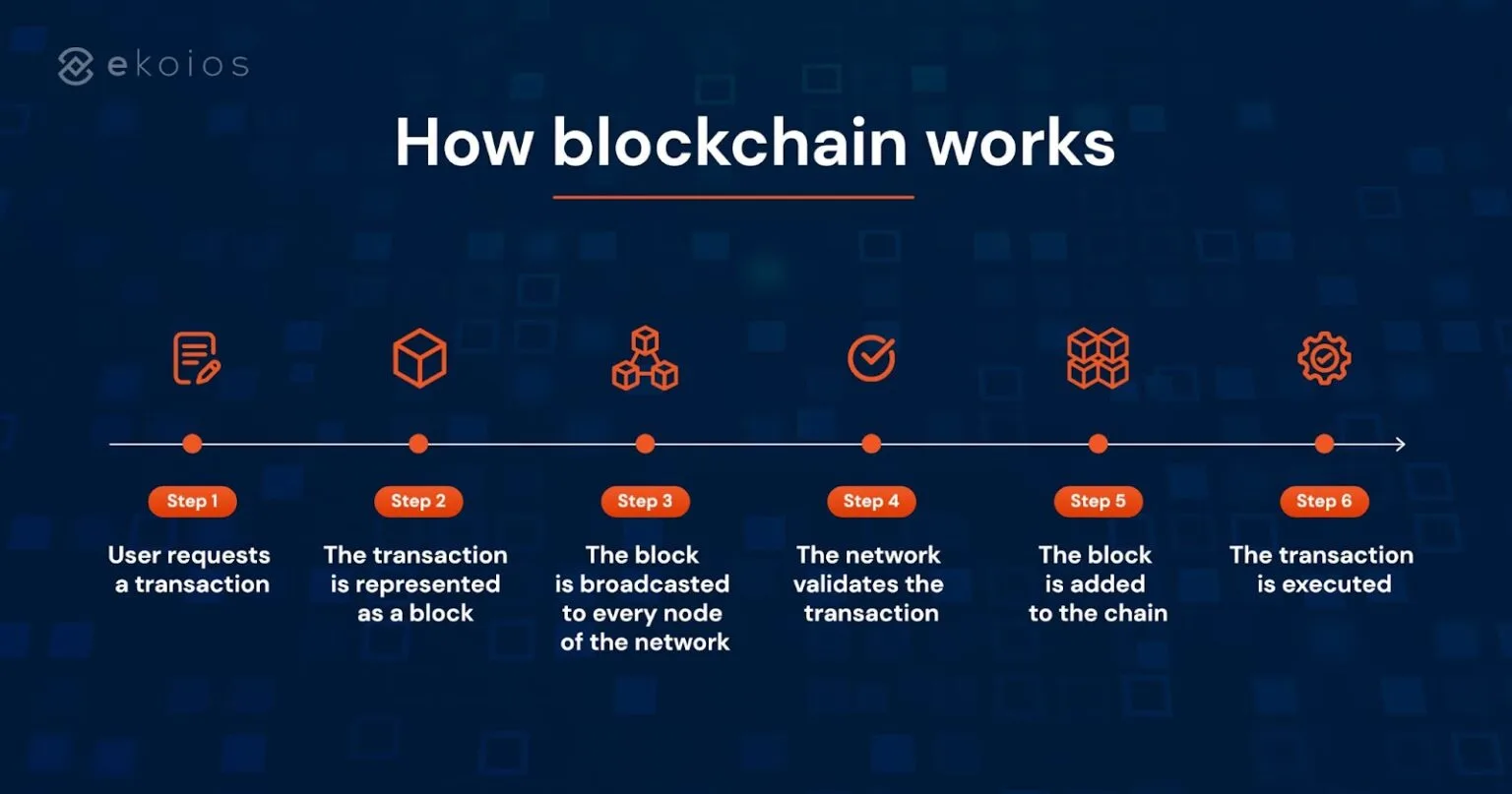
Benefits of blockchain applications development
The reason blockchain-based application development has been so popular lately is that it offers multiple benefits for businesses.
- Security: With blockchain, data is not stored on servers, but across a network of devices, so hackers cannot tamper with information. If a change occurs, users can immediately detect it as a copy of all chains is located on the devices of all network members.
- Speed and Efficiency: With no third party involved, everything is much faster and smoother. There is also the option to automate the process using smart contracts to increase speed and eliminate human error.
- Transparency and Integrity: Application development with blockchain allows all users to access transaction information. As mentioned above, the data cannot be changed without the consent of all users.
- Privacy: Although universal, interactions between members remain private, so users can be assured that their personal details remain anonymous.
7 Blockchain implementations for businesses
Applications development with blockchain can be implemented into a business in a number of ways, including:
- Financial Transactions: Blockchain technology has the potential to revolutionize transactions. The absence of middlemen will not only speed up the process but also facilitate funds or cross-border money transfers securely at an ultra-low fee. Some real-life use cases in firms are: Bitwage and Abra are using blockchain for fund transfer and payrolls, Coinpip is integrating this technology into its app
- Distributed Cloud Storage: Blockchain technology can also be used to host secure cloud storage on a decentralized network. The Storj company is an example of this type of system.
- Smart Contracts: Smart contracts allow for financial transactions, contractual agreements and data to be carried out without the need for third-party regulation, at a fraction of the cost. They are secure and cannot be broken.
- Notary: Blockchain development can also be used for notary creation and authentication purposes. Uproov, a smartphone multimedia platform, provides these services by recording users’ images, videos, or sounds onto the blockchain.
- Supply chain management: Since the supply chain mechanism involves components exchange from multiple entities, the failure at one end can affect the overall process. To tackle this situation, companies such as SkuChain and Provenance are using blockchain technology to create permanent auditable records where stakeholders can see how their goods traveled to the market.
- Digital Identification Process: Blockchain technology can be used to provide us with immutable, indisputable, and secure digital identities, resulting in less fraud and a seamless sign-in experience. One use case is ShoCard, which uses blockchain to verify individual identity on their mobile devices.
- Rewards Programs: By eliminating the middlemen, blockchain helps retailers engage their customers with gift cards, rewards, and other loyalty programs that are interoperable and transferable across multiple platforms and systems. Check out GyftBlock, which is a partnership between bitcoin API developer Chain and Gyft, which provides digital cards that can be traded on the public ledger with security.
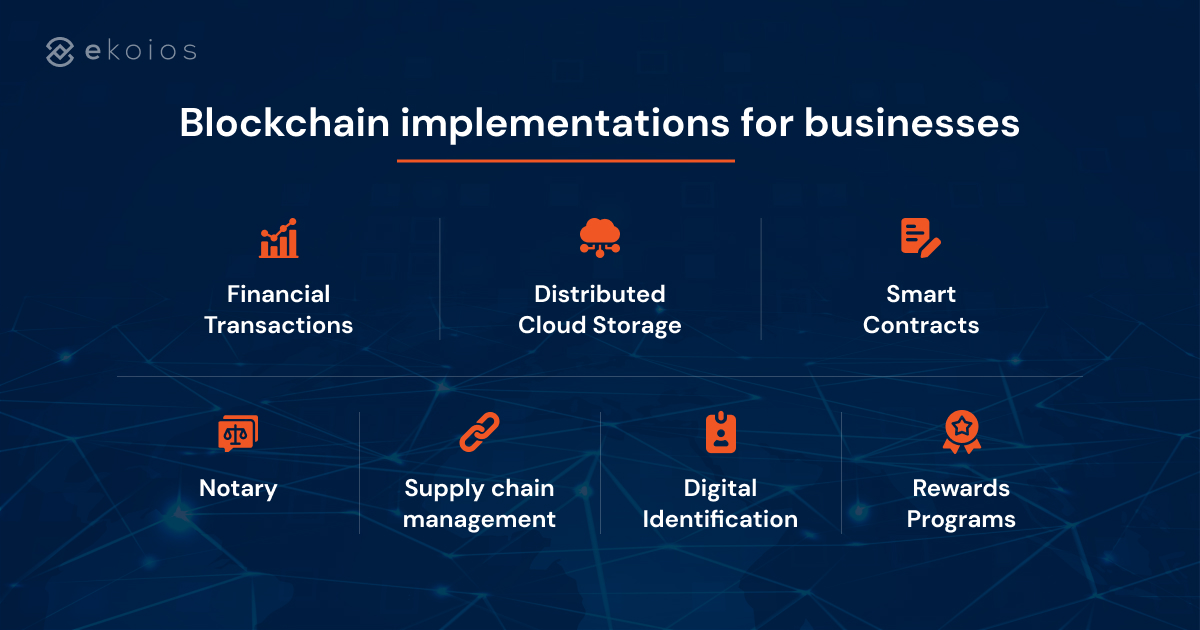
Key industries for dApp blockchain application development service
According to the State of the dApps, there are over 2,100 active decentralized applications by the end of 2022. Such apps are distributed through a wide range of industries with specific use cases, and the prominent ones are as follows:
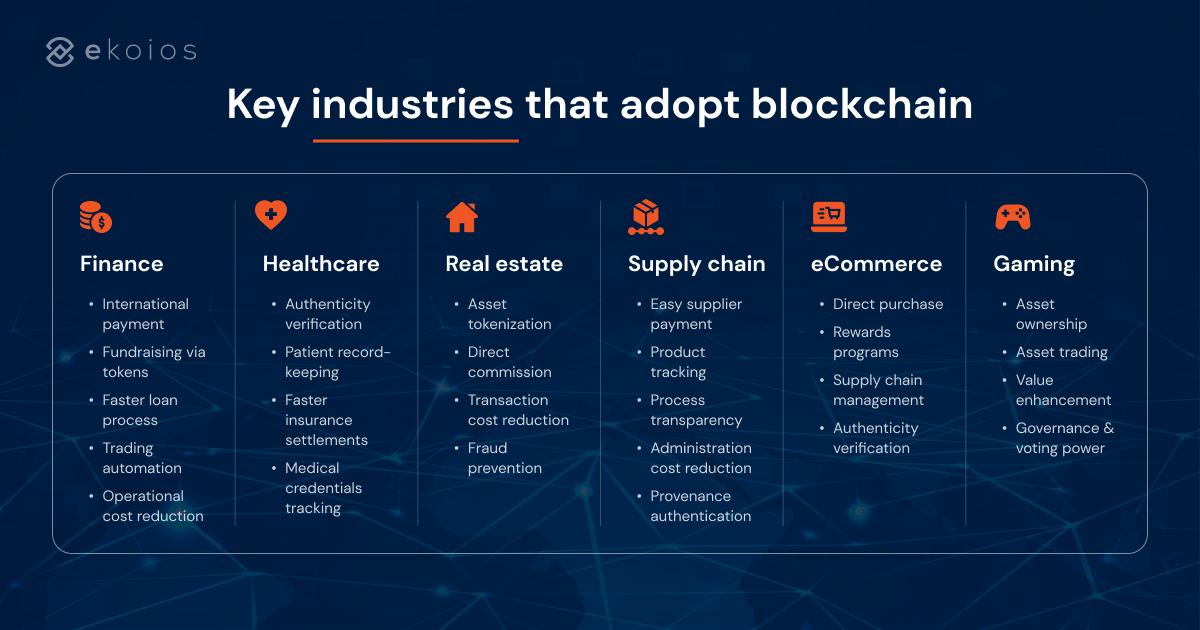
Want to know exactly how they get it done? Explore our detailed article on cross-industry blockchain use cases.
Getting to know the tech stack
As 2022 comes to a close, we’ve defined the top blockchain platforms below. Details on each platform’s statistics, technology, and characteristics can be found in our article Top Blockchain Platforms & Applications.
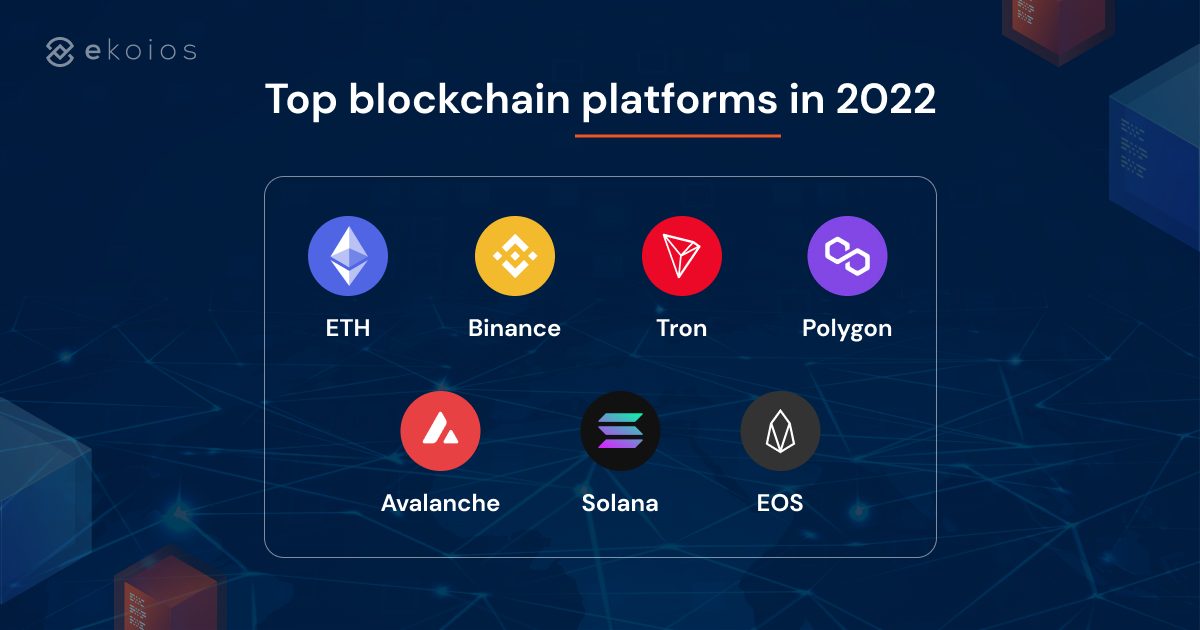
- Ethereum
- Binance Smart Chain
- Tron
- Polygon
- Avalanche
- Solana
- EOS
The choice of platform for your blockchain app will influence the skill set you’ll need from your development team. Several platforms allow developers to create a blockchain app in conventional languages like C++, Java, Kotlin, and JavaScript, while others utilize blockchain-inclusive languages like Solidity and Simplicity. Therefore, you should take into account the cost and effort needed for your existing team to learn a new language, or for hiring a blockchain-specialized team.
4 Factors to consider for your blockchain application
For your convenience, we’ll quickly cover the basics of blockchain application development, then move to the details that a blockchain app requires. Blockchain factors are as follows:
- Public or private blockchain: Private blockchains require a central authority to make any transactions, thus increasing the cost of the blockchain app. On the other hand, public blockchains are permissionless, allowing anyone to participate in the consensus process; thus reducing costs as compared to private blockchains.
📌 Read more: Public and Private Blockchain
- Smart contracts: Examine the programmability and automation of the smart contract features, which ultimately affect your application’s performance.
- Storage: There are many different storage options for blockchain applications. The cost of storage depends on which type of data you need to store on the blockchain using IPFS (InterPlanetary File System), and which to store on other storage services.
- Transaction frequency: The size of a blockchain database is largely dependent upon how many transactions take place on the network. If there are a lot of users using it every day, this will lead to a very fast and large blockchain size. Thus, an accurate estimate of the number of users and a possible number of transactions that will happen per day will help to estimate the cost of developing an application for such a system.
Application factors include app types, platform, complexity, and development team.
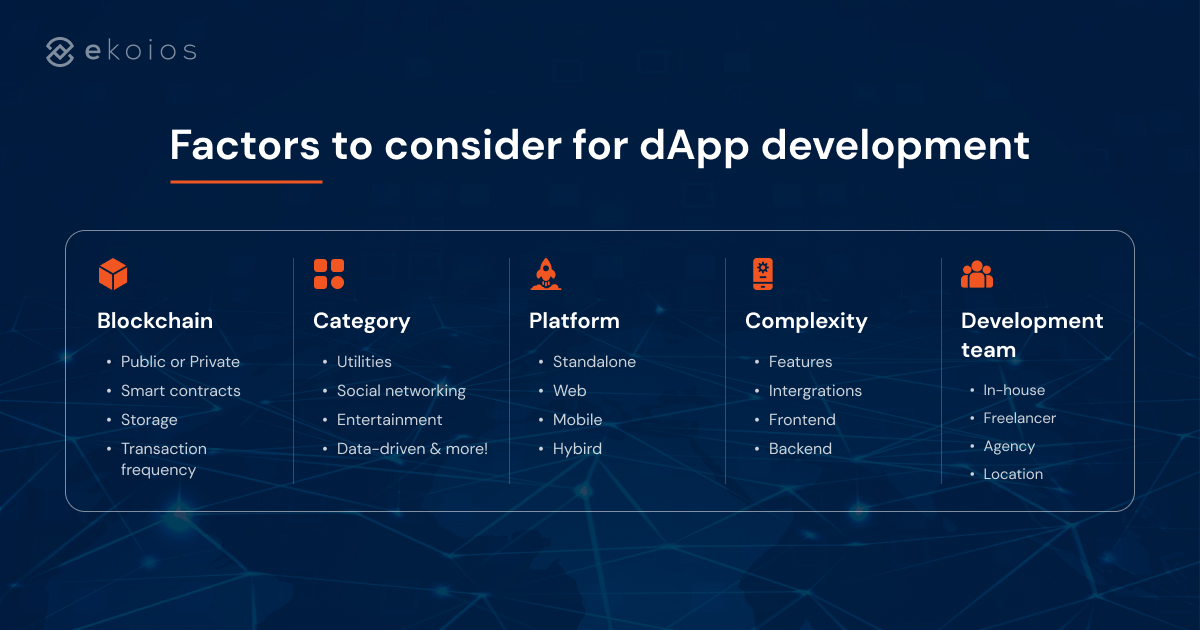
Blockchain application development cost?
Across two leading platforms for blockchain development providers: Clutch and GoodFirms, we’ve gathered a rough estimation of the average price of apps based on their complexity.
- Simple app: from $30,000 to $90,000
- Medium app: from $50,000 to $130,000
- Complex app: from $90,000 to $200,000
As you may notice, the ranges are still huge. An accurate quote really comes down to the specifics of your project and the rate of the development team.
⭐️ Pro tip: Off-shore development outsourcing is the most efficient way to save time, cost, and even your involvement! And if you’re finding a number for your blockchain application, contact our experts at Ekotek today for an exact quote, plus strategic consultation. Send us a message at: contact@ekotek.vn
Custom blockchain application development process
From concept to production, the process of fully developing a blockchain application can be broken down into 6 steps.
- Business analysis – Via client meetings, a business analyst extracts requirements, expectations, and business goals to create a technical specification. From the people in charge of development and communication to frameworks, libraries, and operating systems, this document describes every aspect of the development process.
- Design – Design can consume 8% to 20% of the total development time and budget, depending on its complexity.
- Preparation – This includes configuring the development environment, APIs, backend, and architecture.
- Development + Quality Assurance – These steps occur together as one continuous process. Before deployment, our QA engineers run full regression testing to ensure everything is working as expected.
- Deployment – In order to be approved, an app must adhere to the platform’s rules and conditions. It is critical to analyze both performance data and user analytics after deployment.
- Maintenance and Support – This includes updating libraries, frameworks, and operating systems, as well as implementing new features and modifications to the app according to current business needs.
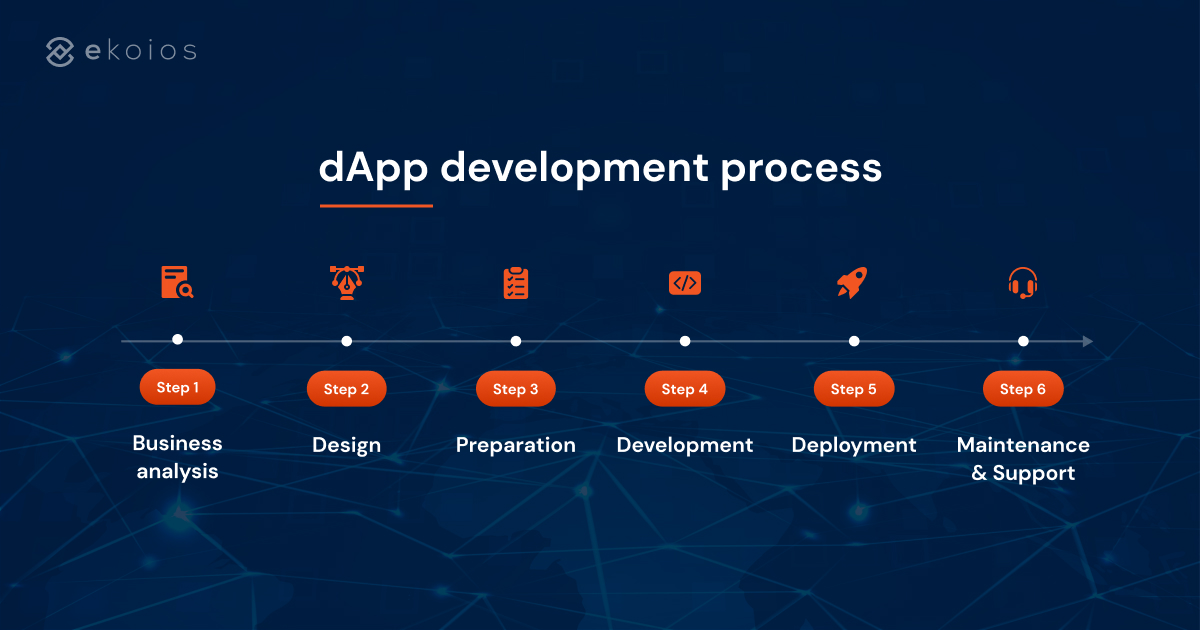
Ending thoughts
Blockchain applications are more secure than any other type of app; they provide fast international transactions, offer transparent storage, and make sure that data can’t be altered. And as blockchain technology is still in its early days, companies should carefully examine various factors as mentioned above to guarantee the optimal development process and business outcomes.
So if your application idea is waiting for action, discuss it with Ekotek – a blockchain application development company that knows how to build blockchain apps with 140+ projects successfully delivered. Let us help you choose the best solution, tech stack, and course of action.
- 1
- 2
- 3
- 4
- 5
- 6
- 7
- 8